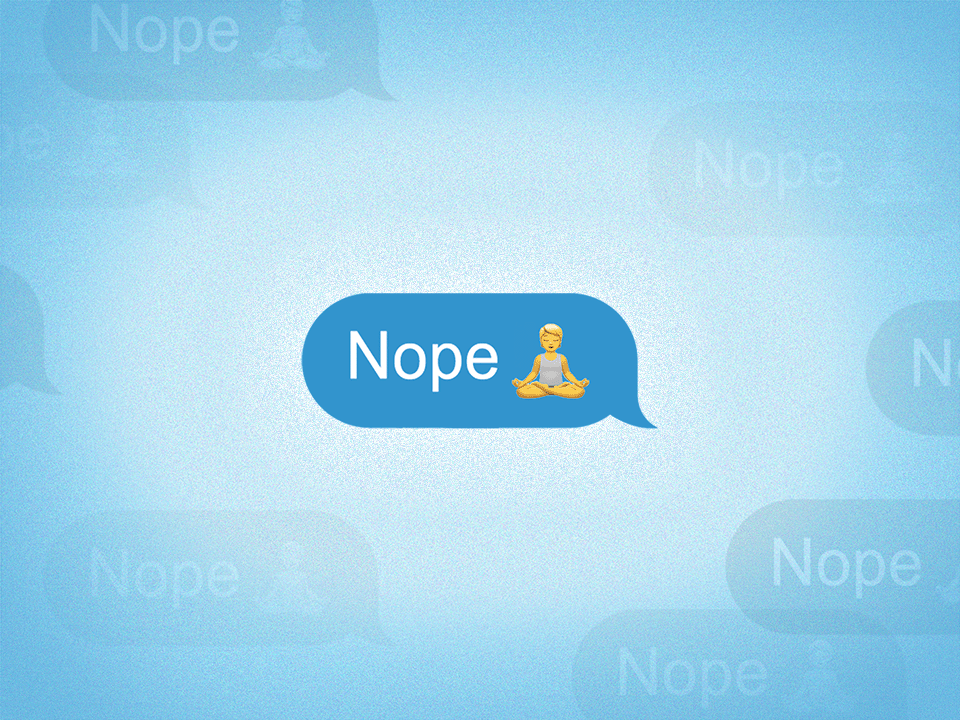6 Realistic Ways to Do Less Without Blowing Up Your Life
Make life less hard in 2024.
Whether you’ve fallen into the trap of romanticizing productivity (TikTok, pls stop) or have too damn much on your plate, most of us could probably stand to take a break. Between juggling project deadlines, scheduling (see: rescheduling) catch-ups with friends, feeding yourself, and ensuring you have clean underwear, most of us believe that "doing less" means sacrificing important parts of our well-being. That goes double this time of year when the "New Year, New You!" narrative is on blast.
Productivity isn’t always the enemy. But consistent pressure to do the most can stress you out, add to your anxiety, or maybe even lead to burnout.
[Doing too much? Reset your mindset by signing up for Wondermind's 7-Day Do-Less Challenge!]
Instead of trying to make everything happen in the year of our lord 2024—what if you…didn’t? While some responsibilities are non-negotiable—such is the unfortunate reality of modern life—there are still ways to balance the demands and opportunities of everyday life with our need for rest, relaxation, or even fun. Ahead, mental health experts weigh in on actually realistic ways to do less—or at least feel like you are.
1. Audit how you spend your time.
OK, so this is a task, but it’s a short-term pain for a long-term gain. Basically, before you can figure out where to cut back, you have to know what your current time and energy output is, says clinical psychologist Ryan Howes, PhD. Logging a typical week in a journal or time-tracking app would give you a very detailed report, but even a day or two could give you some valuable insight. Be sure to keep an eye on everything from meetings and dates to doomscrolling and Tinder-swiping, but don't stress about getting literally everything unless that’s really important to you. Getting a sense of the big picture is enough here.
From there, assess whether the things you put your time into are doing much for you. For example, if making lunches for the week saves you money and keeps you healthy, it could be worth the extra hours. If you end up getting sick of your salmon bowl on day two, maybe making the frozen aisle your go-to would free up some space on your cal. "Contemplate where your effort and energy is going and whether that's bearing fruit or not," Dr. Howes suggests.
Then, see if there are opps to make easy cuts. Notice a two-hour span of pointless Instagram scrolling before bed? Chop chop. Get the sense that dusting once a week doesn’t make you any happier than doing it twice a month? Bye. Did your manager tell you to delegate more? Done. Also, remember there's no shame in leaning on community resources or capable professionals.
If you need an alternative or want extra credit, Dr. Howes suggests auditing your time-spent in 2023. (OK, yes, some New Year's cliches can be helpful.) You might realize that months of overtime in hopes of a promotion aren’t going anywhere or that you spent more time hanging with people who drain you than the ones who don’t.
2. Quiet quit your life.
Speaking of places you can pull back on, buds at Merriam-Webster describe quiet quitting as "the practice of doing the minimum amount of work required for one's job" or, more colorfully, "putting in no more time, effort, or enthusiasm than absolutely necessary." (You can read more about quiet quitting here.)
It's not as insubordinate as it sounds. In most cases, it's just a reasonable call to perform the job you're paid to do rather than going above and beyond. According to Dr. Howes, many people are "over-functioning" at work in ways that go unnoticed and unrewarded, so maybe doing less is just the work perk you need in your life.
Outside of work, we can quiet quit our relationships, domestic responsibilities, heck, even our hobbies by just lowering our expectations and easing up a little. Again, do you really need to dust once a week?
If you’re at a loss about which bar you can lower, think about external feedback like a performance review, insight from a trusted coworker, or a lack of feedback from a friend, says Dr. Howes. For example, those beautiful presentations might be a source of pride, but why bother if your manager was just as impressed that time you half-assed it? What about the homemade brownies you fret over when your bestie devoured the boxed kind just the same?
3. Practice saying no.
You probably don't have to brainstorm long to think of something you wish you would’ve declined. We do favors we don't have time for, hang out with people we don't like, go places we don’t enjoy…the list goes on.
Protecting your time by setting boundaries or limiting your availability, whether that's turning off notifications or blocking off windows of time to dedicate to specific responsibilities or people can help you do less too. But all of that requires using the word No.
Of course, it's not always easy. But the more you do it, the more evidence you have to support the fact that the world doesn't end when you cancel plans. Thus, saying no more often makes it easier to do over time.
Whether your goal is to soften the blow or make “no” work for a specific context, there are many ways to do it. Instead of using your limited social time to get drinks with that acquaintance you ran into on the street, try: “It's not a great time, but it was so good to see you!” Don’t want to take on a last-minute project? Something like, “Sorry! Usually, I'd love to help, but I'm totally swamped,” could work. It’s less blunt, but the result is the same: You doing you.
4. Stop multitasking.
Studies have given us a laundry list of reasons why doing more than one thing at a time sucks: It makes us less efficient and more prone to mistakes, stresses us out, and impacts our memory.
Sure, walking and talking or listening to a podcast while knitting aren’t a big deal because they come automatically. But when we evoke multitasking in the name of productivity, we're usually talking about what experts call task-switching, or going back and forth between multiple things, which our brains are way less good at, says Gloria Mark, PhD, psychologist and author of Attention Span: A Groundbreaking Way to Restore Balance, Happiness and Productivity.
Even without getting into the neuroscience of it, you probably relate. How many times have you missed something on Zoom while glancing at your email, or accidentally tuned out your partner because you were a liiittle too focused on "mindless" TikTok scrolling?
There’s no need to cut out multitasking where it's genuinely enjoyable or helpful, but for things that require focus, like work, studying, or quality time, try upgrading to monotasking, suggests Dr. Mark.
This can be hard at first because, as much as our brains hate multitasking, they love the instant gratification of doing all of the things. However, once you make a habit of focusing on one thing at a time (might I suggest distraction blocker apps and extensions?), you’ll likely be more productive, less taxed, and end up expending less energy in the long run.
5. Find your peak focus hours and spend them on the hard stuff.
Doing the must-do to-dos more efficiently (see: working smarter, not harder) is an easy way to squeeze extra downtime into your schedule. One helpful strategy is tackling need-to-focus tasks when your brain is most ready for it. "People have rhythms of focus that correspond with the ebb and flow of our attentional resources," explains Dr. Mark.
You can find your own golden hours by paying attention to when you're most productive and at ease with your responsibilities, Dr. Mark explains. For a lot of us, that peak focus comes between the late morning and early afternoon, but it varies from person to person.
Once you know when you’re at your best, you can make time to do hard things. After those hours are up, shift into more mindless or tedious tasks as a brain break.
6. Don’t feel guilty for getting less done.
It might sound obvious, but it's easy to forget that you can’t do it all—especially in a system that often demands more work for less than we need to exist. But even under these circumstances, making room for rest needs to be part of your regularly scheduled routine—despite your nagging to-do list.
"It's important for us psychologically and physically to have downtime because that's where we recover enough to perform in the world," says Dr. Howes. Of course, as humans, we're also quick to beat ourselves up for failing to do the impossible.
If it helps, remember that doing less is paramount to making room for what you value. Maybe once you get over the initial hump of discomfort, you'll discover kicking your doomscrolling habit frees up a lot of time to spend with your friends or family, and you're less stressed out to boot. Maybe not chasing that promotion means spending more time traveling or protecting your mental and physical health. Even if your life looks messier or less perfect than you thought it would, you might be happier in the end!
Not to get all existential on you, but "we've only got one life on this planet," says Dr. Howes. "If possible, it's essential for us to try to enjoy it and spend our time doing what actually matters to us." Even if what we’re doing is a bunch of nothing.
Wondermind does not provide medical advice, diagnosis, or treatment. Any information published on this website or by this brand is not intended as a replacement for medical advice. Always consult a qualified health or mental health professional with any questions or concerns about your mental health.




